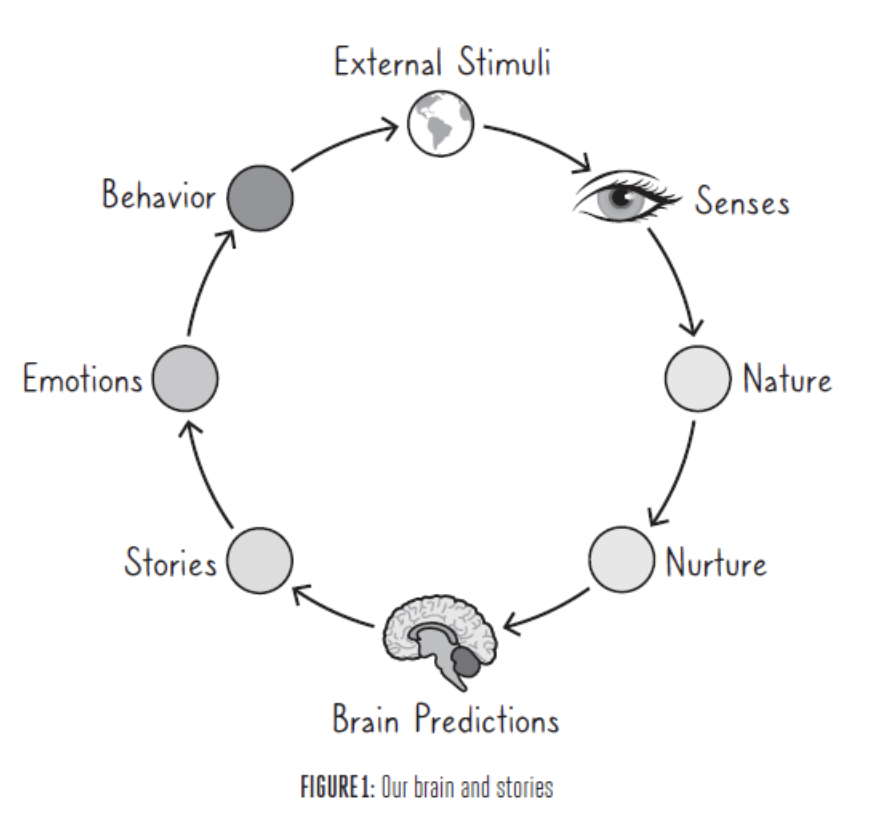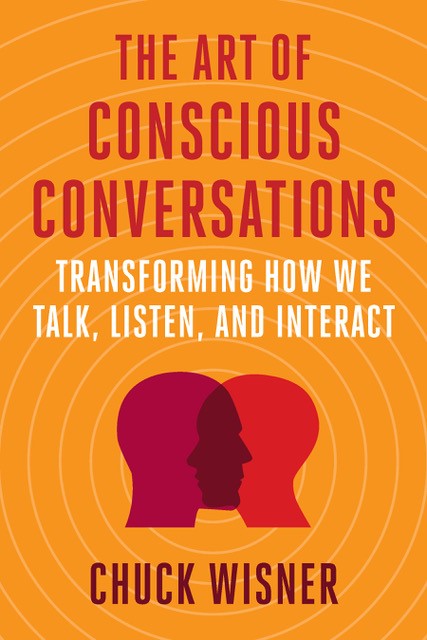Can you remember a teacher, mentor, or boss who taught you how to be a good listener? I can’t.
I remember being taught to study facts so I could answer questions. My educators and bosses rewarded me for having the solutions and speaking up. I suspect that you can relate to this cultural pattern.
Our knowledge and beliefs shape our identities and egos over time, but that “knowingness” impairs our ability to listen mindfully. The complexity of our surrounding world further limits our ability to listen. Our senses take in billions of bits of information each second—spoken words, body language, tone of voice—and our brains interpret it all, without our awareness.
The human brain isn’t anything like a radio or TV antenna. A lot happens in the nanosecond between the time someone sends a signal and time our brains receive it. Our biases, judgments, and emotions kick in imperceptibly. In that nanosecond, we create a story—mostly on autopilot—that is embedded with interpretations and assumptions. Given the intricacy of the process, it’s not surprising that mindful listening requires an awareness of communication patterns, mental focus, and a lot of practice.
What You Say Isn’t What I Hear, and Vice Versa
I’m highly sensitive to visual cues and energy, so when I meet another person for the first time, my brain almost exclusively focuses on their facial expression and overall energy. Are they open or closed? Judgmental or respectful? Aggressive or passive? Defensive or curious? Subconsciously, my brain is doing its job. In a flash, it compares my past experiences with the incoming signals, then it presents me with thoughts, feelings, and reactions. The process looks something like this:

I learn so much about the speaker in just moments, but when they tell me their name, it invariably goes in one ear and out the other. It just doesn’t stick like the other incoming signals. I have to work hard to rebalance my attention so I can become a more mindful listener.
Here are a few skills and practices for increasing our ability to be a mindful listener and to transform the way we engage and connect with others.
Observing Your Listening Patterns
When we know and accept the complexity of our brains and our limited transmitting and receiving capabilities, we can begin to track our listening patterns. A skill required for mindful listening is acknowledging that our interpretations and assumptions can be wrong. Knowing my pattern of absorbing faces and emotions at the expense of remembering names allows me to observe and shift the pattern.
Here are some common listening patterns:
- Letting our inner voices overwhelm us instead of focusing on others
- Preparing our response or rebuttal rather than really listening
- Being distracted by visual or physical stimulation
- Getting emotionally hijacked and disrupting others mid-sentence
- Being fearful of voices of authority
- Assuming our opinion is right and true
- Prejudging other perspectives instead of seeking understanding
Rather than making autopilot snap judgments, we can practice tracking and being aware of and catching our patterns nonjudgmentally. Over time, we can consciously change a nonproductive pattern and kick our listening skills into a higher gear. Then we can become more open vessels to absorb other perspectives.
Your Opinions Aren’t the Truth
The second skill is courageously looking at the thoughts lurking beneath the surface of our interpretations and stories. Our familiar stories are made up of facts and opinions. But our brains often turn facts and opinions into a perplexing, tangled web of miscommunication and misunderstanding.
We can enhance our ability to listen mindfully by consciously distinguishing between fact and opinion. We start by acknowledging that facts and objective reality are based on our shared senses and social norms. They are crucial for grounding and checking our interpretations.
Opinions, on the other hand, are the collection of beliefs that we adopt throughout life. They are complex, addictive, personal, and uncertain. Our ability to listen mindfully depends on our willingness to question our opinions and to hold them lightly. The interpretations that feed our opinions aren’t the truth. They are one of many possible opinions.
Practice observing the interplay between facts and opinions in conversation. Note how they conflate and confuse. Be willing to restart a frustrating conversation rooted in facts in order to unearth and curiously discuss differences in opinions.
Where Is Your Attention?
In conversation, we are often wrapped up in our heads. Committees of inner voices vie for our attention. These private conversations are distracting, but we can do plenty to quiet the committee. We can begin by paying attention to where our attention is literally. We only have so much energy to expend during our interactions, and if our spinning inner voices use up all our energy, there’s little left for listening.
Notice where your attention is focused during a conversation. Is your mind spinning with thoughts about how to respond to others? Are your feelings and emotions distracting you from listening? Are you interrupting? Are you paying close attention to the speaker’s body language, tone of voice, and words? Notice your attention without judgment.
To be a more mindful listener, purposefully point your attention at the other person. Begin with your vision. Look them in the eyes and give them your full attention. This simple act can have a calming effect on you, and your conversational partner will take note. The undivided attention that you offer or receive is engaging and enhances mutual understanding.
Interpretations vs. Inquiry
We are well rewarded to advocate for our opinions. Our learned tendencies to rush and impose our perspective blinds us to inquiry, the other half of a collaborative conversation. Open-minded inquiry asks us to acknowledge the complexity and difficulty of listening and interpreting others’ words. As we practice shifting our attention, we can also take a breath and resist the urge to jump in with our thoughts.
Sincere questions are the antidote to unproductive advocacy. Learn to ask questions with a healthy dose of curiosity and the intention of better understanding others.
To practice mindful listening, ask yourself one or more of these questions:
- What are my conversation partner’s desires and wants?
- What are their concerns about the future?
- Are power issues impacting this conversation?
- What standards might be driving their judgments?
Each question we ask ourselves or others can gently expose our inner thoughts, which can deepen conversations and transform our listening.
Be kind to yourself as the observer of your patterns, investigate your opinions, shift your attention, and practice open inquiry. Becoming a more mindful listener takes practice. But each small change you adopt can transform you and your conversations.



